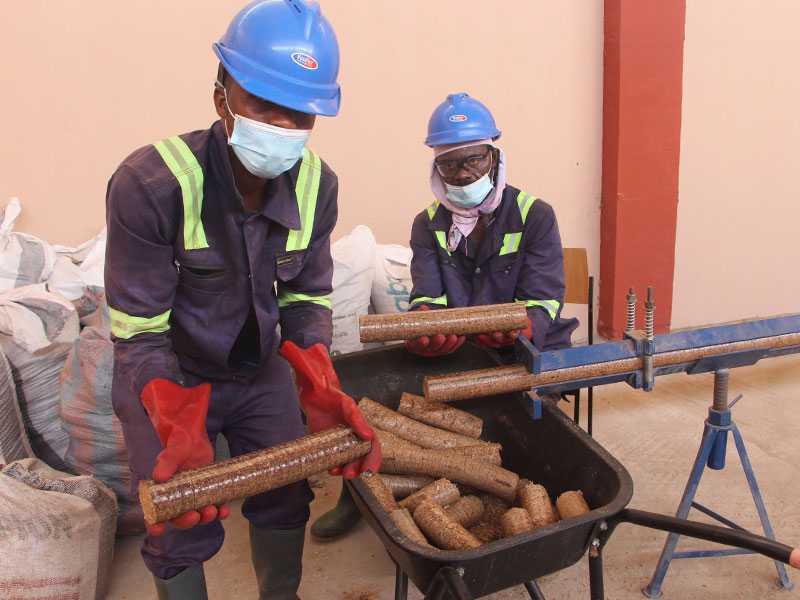
14 Jul 3 Entrepreneurs in South Africa, Ghana, & Uganda Beat over 1,000 Applicants to Win Prestigious award
A business which gives out virtual cash in exchange for rubbish, a start-up which converts faecal sludge into fuel briquettes, and an enterprise which offers smart metering solutions for solar mini-grids, have won the SEED Low Carbon Award (SEED Awards) (SEED.uno). SEED was founded as part of a global partnership between the United Nations Environment Programme (UNEP), the United Nations Development Programme (UNDP) and the International Union for Conservation of Nature (IUCN).
Regenize, a South African enterprise founded in 2016 by entrepreneur Chad Robertson, rewards residents with Remali, a virtual currency that can be used to buy airtime, data or grocery vouchers, in exchange for recycled materials. The Cape Town-based business provides informal waste collectors with community-based recycling hubs, uniforms, transportation, and connections to clean recyclables. Once collected and sorted, Regenize purchases the recycled materials and sells them in bulk to waste processors. In this way, Regenize has diverted 231 tonnes of waste from landfills. SEED will help Regenize scale by setting up 151 decentralised recycling hubs and integrating 423 informal waste collectors into its model.
The winning start-up in Ghana, JVL-YKMA Recycling Plant, was founded in 2020 and processes organic waste and faecal sludge to produce compost for commercial farming and affordable, fuel-efficient briquettes for households and industries. JVL-YKMA Recycling Plant, which is run by young engineer, Bernadette Dzifa Agbefu, is formed of an innovative Public-Private Partnership between Jekora Ventures Ltd and the Yilo Krobo Municipal Assembly. It processes up to 1,800 tonnes of organic solid waste and up to 5,000 cubic meters of faecal sludge to produce up to 200 tonnes of compost and 1,000 tonnes of low-cost fuel briquettes annually. SEED will help the business grow its production value through increasing faecal sludge treatment capacity and running a second briquetting shift.
In Uganda, the winning enterprise Peec Energy offers remote monitoring and smart metering solutions for solar mini-grids and solar home systems in local communities, currently benefitting 3,800 households. Peec Energy, founded in 2016 by entrepreneur Philip Kyeswa, provides PAYG meters to local mini-grid developers, allowing them to sell energy in off-grid locations and to remotely monitor their utility assets and collect bill payments via a central software. The enterprise also provides women and youth with solar and biogas training and certification from the Directorate of Industrial training in Uganda. Under SEED’s expert guidance, Peec Energy aims to expand throughout Uganda, Rwanda, and Congo to reach 500,000 connected households, impacting more than 1 million people.
Through the SEED Awards, we will support 48 enterprises in 2021, and through our other programmes, several hundreds more
Rita Schwarzelühr-Sutter, Parliamentarian State Secretary in the German Federal Environment Ministry (BMU), which is the primary sponsor of the SEED Low Carbon Awards, commented: “Micro and small enterprises play a vital role in the transformation to a decarbonised, more sustainable development. Many of these enterprises contribute greatly to this transformation. The SEED Awards are instrumental for scaling such enterprises, equipping the founders with the tools, knowledge and networks they need to maximise their impact within their local communities and beyond.”
The SEED Awards ceremony, taking place today at the UN’s High-level Political Forum on Sustainable Development (HLPF), will also see SEED present its ‘Green Recovery Snapshot’ (bit.ly/3hCJSDP) findings, which calls on governments, donors, and financial providers to increase targeted support for MSMEs as they stimulate economic growth in a post-COVID world. MSMEs are responsible for creating seven out of ten jobs across emerging markets, and green and social MSMEs deliver environmental and social impact through their activities, products, and services, making them essential actors in achieving a green recovery.
Winners of the SEED Awards will be awarded matching grants of between EUR 10,000 – 15,000 and will receive tailored one-to-one advisory services for up to a year to scale their operations, as part of the renowned SEED Accelerator (bit.ly/3AVM4xM) programme. In line with the principle of ‘awarding the best and moving the rest’, 39 runners-up will also be supported through the SEED Catalyser (bit.ly/3hABXXt) programme, to refine their business models and optimise their impacts while advancing their investment readiness.
SEED’s Director of Operations, Rainer Agster, added: “The calibre of SEED Award entries this year was outstanding, and we extend our congratulations to all nine winners and 39 runners-up. We hope the enterprises identified and promoted by the SEED Awards will be a source of inspiration for aspiring entrepreneurs across emerging economies. Through the SEED Awards, we will support 48 enterprises in 2021, and through our other programmes, several hundreds more. For each of those, however, there are thousands more eco-inclusive enterprises furthering SDGs which can be amplified with the right support. Therefore, we strongly encourage policy makers and financial actors to take a closer look at these eco-inclusive businesses and start or scale support programmes for them.”
Of the 2021 SEED Awards cohort, 69 per cent of enterprise leaders are 18-35 years-old and 52 per cent are female-led enterprises. Since their inception in 2005, the SEED Awards have awarded 311 enterprises in 40 countries and have facilitated the disbursement of over EUR 1 million in grants. Each individual SEED enterprise has saved an average of 7,300 tonnes of CO2, generated more than 9,399 kWh of renewable energy, and created 28.4 jobs, out of which 32 per cent are offered to people at the Bottom of the Pyramid (BoP).
For more information on the winners and runners-up, please visit the SEED website (bit.ly/3xBgrY8).
Distributed by APO Group on behalf of SEED.
Source: APO
